Children tend to show natural aggression beginning around their second birthday. The “terrible twos” are brewing at this point and children have developed to the point where not only do they know that they are independent individuals but they can walk themselves and talk themselves to wherever they please. While they are thus exploring the world children come to realise that they can exert some control over their surroundings and often engage in aggressive outbursts if they are denied this control. Children then engage in aggressive outbursts when they feel out of control, frustrated or desire attention. In lieu of expressing their feelings verbally, children often turn to kicking, hitting, biting, screaming and throwing things to make their emotions known.
Variables Influencing Aggressive Outbursts
No two children will engage in aggressive outbursts in exactly the same way and there are several factors that influence these episodes. For example, boys tend to have more natural aggression and aggressive outbursts than girls. Age also influences aggressive outbursts in that during infancy these behaviours – crying, kicking out, etc. – are defensive and used in order to gain attention to fulfil a need, but during the toddler years these behaviours become overtly aggressive and are used to manipulate a situation or react to an unsatisfactory outcome. By school age, these behaviours tend to become reactionary and often result from a perceived slight or insult.
Avoiding Aggressive Outbursts
Most young children have aggressive outbursts when they are frustrated. These children have yet to develop the language skills or vocabulary that they need to talk through their emotions, but they also may lack the ability to see the world through other’s eyes. This means that children are necessarily “short sighted” and often unable to see the bigger picture surrounding certain actions or events which might better explain the situations that are frustrating them. Parents can try to avoid aggressive outbursts by lowering frustrations and making sure that their children always feel in control of something. Watching children to ensure that they don’t become overly hungry or tired, offering children limited choices in most matters and avoiding people or places that make children feel distinctly uncomfortable are all ways that parents can help their children avoiding having aggressive outbursts.
Coping with Aggressive Outbursts
Unfortunately, not all aggressive outbursts can be avoided but parents do have choices in how they react to and cope with these events. Many parents choose to:
- Ignore aggressive behaviours that can be tolerated. Denying a child the attention that (s)he craves often helps defuse aggression.
- Channel the child’s energy. A child with the energy to kick at others has the energy to kick a football instead.
- Show affection. Many times a child acts aggressively if (s)he is feeling hurt and a hug can be very soothing.
- Talk with the child. Often if a child understands a whole situation they are less likely to become frustrated and act aggressively.
- Removing a child from the trigger. Particularly if a child is becoming a danger to him/herself or others, picking them up and taking them to another location may be best.
Children and aggressive outbursts tend to go hand-in-hand. Usually children engage in aggressive behaviours because they are frustrated, feeling out of control or want attention. There is much that parents can do to avoid these outbursts, and many options to choose from in how they cope with aggressive outbursts when they do occur. Though some aggressive outbursts are normal, if a child seems frequently and inappropriately angry parents should consider consulting a GP or child development expert for more information and advice specific to their child.


